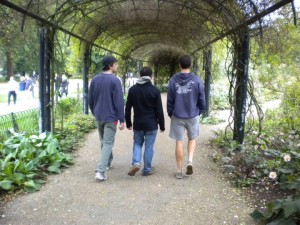I first noticed it one of our first walking tours. We were walking around Bloomsbury when we approached Bedford Square. It was a welcome patch of green and seemed reassuring and welcoming even from our first day in London, but on this day we actually tried to enter the small park. “Well it looks as if the Duke has decided to close the park today,” said Professor Qualls, his voice harboring a tone of disappointment. It was this moment that an idea dawned on me, public spaces in London aren’t truly “public,” they are mercifully given to the people by the aristocracy to brighten up their gloomy lives. For this reason, if the Duke of Bedford would like to have a personal picnic, or the Queen wants a day by the pond, they can close down any park they’d like for their own personal enjoyment.
This fact makes me a little perturbed. What is public space? That is one of the appealing things of Central Park in NYC, it is run by the publicly elected parks department officials. In that way the people decide who runs their parks. This is not the case in London.
The ownership of the “public” space is just another example of the feudal concepts of land ownership that still exist in England today. Just like the museums however, it seems to be the price one pays for perfectly manicured sports fields and classical European gardens that are open to the public. I am of course, talking about one of my favorite parks, Regent’s Park which I was able to return to a few times in pursuit of different things.
When it comes to parks in London however, the crown jewel (pun intended) is of course Hyde Park. It would take days of exploring to uncover all of the hidden landmarks and monuments.
So despite what you might think about the illusion of public space in a Monarchical space, these parks a a great place for a stroll on a sunny British day.
(personal photo)


5 responses so far ↓
Mary Kate // Sep 20th 2010 at 11:28
This is an interesting point, Matt! I hadn’t thought of “public space” in this way. I think that at the time the parks were open, it was essentially a benevolent gesture by Victorian aristocrats (in Hyde Park’s case, Queen Victoria) and it probably didn’t occur to the underclasses to ask for more. Since the arrival of more modern, democratic ideals, maybe the English don’t feel the need to sue for greater ownership of parks simply because the Royal Park Society/individual dukes and barons hasn’t abused its power. The parks are still free and open to the public; the parks are, for the most park, clean and well taken care of; and they’re a source of pride and enjoyment for Londoners. There’s really no reason to complain, especially considering the British aversion to making a fuss. So while I agree with you that the private ownership of parks is a relic of feudalism, I’d add that there’s not much practical reason, to date, to change the current system.
Karl // Sep 20th 2010 at 11:42
Are the public parks here actually privately owned? How are they administered? Who takes care of Hyde, Regents, etc.?
mattg // Sep 20th 2010 at 11:54
I can tell by all of the men in the uniforms manicuring the gardens (and some research)that there is a park department, I suppose I am just confused by the ownership of these parks and the aristocracies at least ceremonial ability to close some of the smaller parks.
battilaj // Sep 20th 2010 at 11:56
I just posted about how London is full of artificially privacy spheres, and I think your concept of privately owned “public” space really capitalizes on that idea.
stepheniem // Sep 20th 2010 at 13:44
I think you could take the feudalism parallel even further. It was tradition that part of a feudal estate would be opened to the serfs and lower gentry that lived off of the land. (It’s common to read about uprisings were feudal land customs weren’t being observed.) I think we see some of that tradition in the parks. I’d actually be interested in knowing how many of the parks/squares/markets have roots in that tradition.
You must log in to post a comment.